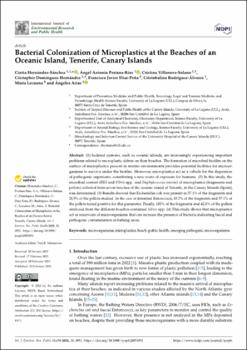Bacterial Colonization of Microplastics at the Beaches of an Oceanic Island, Tenerife, Canary Islands.
Date
2023Abstract
(1) Isolated systems, such as oceanic islands, are increasingly experiencing important
problems related to microplastic debris on their beaches. The formation of microbial biofilm on the
surface of microplastics present in marine environments provides potential facilities for microorganisms to survive under the biofilm. Moreover, microplastics act as a vehicle for the dispersion
of pathogenic organisms, constituting a new route of exposure for humans. (2) In this study, the
microbial content (FIO and Vibrio spp. and Staphylococcus aureus) of microplastics (fragments and
pellets) collected from seven beaches of the oceanic island of Tenerife, in the Canary Islands (Spain),
was determined. (3) Results showed that Escherichia coli was present in 57.1% of the fragments and
28.5% of the pellets studied. In the case of intestinal Enterococci, 85.7% of the fragments and 57.1% of
the pellets tested positive for this parameter. Finally, 100% of the fragments and 42.8% of the pellets
analyzed from the different beaches contained Vibrio spp. (4) This study shows that microplastics
act as reservoirs of microorganisms that can increase the presence of bacteria indicating faecal and
pathogenic contamination in bathing areas.






